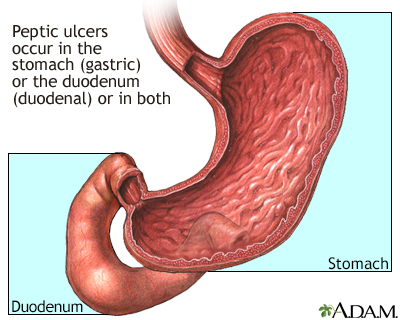Peptic Ulcer

What is a Peptic Ulcer?
A peptic ulcer is a sore or lesion that forms in the lining of the stomach or the upper part of the small intestine (duodenum) due to the erosion of the protective mucosal layer. There are two types of peptic ulcers: gastric ulcers, which occur in the stomach lining, and duodenal ulcers, which occur in the duodenum.
Who's at risk for Peptic Ulcers?
Factors that increase the risk of developing peptic ulcers include frequent use of nonsteroidal anti-inflammatory drugs (NSAIDs), infection with the bacterium Helicobacter pylori, smoking, excessive alcohol consumption, and a family history of ulcers. Older adults and individuals with chronic medical conditions, such as liver, kidney, or lung disease, are also at higher risk for developing peptic ulcers.
What causes Peptic Ulcers?
Peptic ulcers are primarily caused by an imbalance between the stomach's protective mucosal layer and the acidic environment it needs to break down food. The two main factors contributing to this imbalance are infection with the bacterium Helicobacter pylori and the long-term use of NSAIDs, such as aspirin, ibuprofen, or naproxen. Other factors, such as stress and lifestyle habits, may also contribute to the development of peptic ulcers.
How does a Peptic Ulcer start?
A peptic ulcer starts when the protective mucosal layer of the stomach or duodenum is compromised, allowing the stomach's acidic environment to damage the underlying tissue. This can occur due to the presence of Helicobacter pylori, which weakens the mucosal barrier, or the use of NSAIDs, which reduce the production of protective mucus and prostaglandins.
What are the symptoms of Peptic Ulcers?
The most common symptom of a peptic ulcer is a burning or gnawing pain in the upper abdomen, often occurring between meals or at night. Other symptoms may include bloating, heartburn, nausea, vomiting, loss of appetite, and weight loss. In some cases, peptic ulcers can cause more severe complications, such as bleeding, perforation, or gastric outlet obstruction.
How is a Peptic Ulcer diagnosed?
Peptic ulcers are typically diagnosed based on the patient's symptoms, medical history, and a physical examination. To confirm the diagnosis, a healthcare provider may order additional tests, such as an upper gastrointestinal endoscopy, barium swallow, or breath, blood, or stool tests to detect the presence of Helicobacter pylori.
How can Peptic Ulcers be treated?
Treatment for peptic ulcers depends on the underlying cause and the severity of the ulcer. In most cases, medications are prescribed to reduce stomach acid production, such as proton pump inhibitors (PPIs) or H2-receptor blockers, and to eradicate Helicobacter pylori infection, if present. In some cases, surgery may be necessary to treat complications, such as bleeding or perforation.
What complications may occur with Peptic Ulcers?
Complications associated with peptic ulcers include bleeding, perforation (a hole in the stomach or duodenum), and gastric outlet obstruction (blockage of the stomach's exit). These complications can be life-threatening and may require emergency medical attention or surgery.
How can I prevent Peptic Ulcers?
Preventing peptic ulcers involves addressing the factors that contribute to their development, such as avoiding excessive use of NSAIDs, managing Helicobacter pylori infections, and adopting a healthy lifestyle. This may include quitting smoking, limiting alcohol consumption, reducing stress, and maintaining a balanced diet. It is also important to follow your healthcare provider's advice and recommendations for managing any underlying medical conditions that may increase your risk of developing peptic ulcers.
Long-term management of Peptic Ulcers
Long-term management of peptic ulcers involves adhering to the prescribed treatment plan, monitoring for complications, and making necessary lifestyle changes. Regular follow-up appointments with your healthcare provider are essential to ensure proper healing and prevent recurrence. In some cases, ongoing medication may be required to manage symptoms and prevent further ulcer formation.
What is recent research saying about Peptic Ulcers?
Recent research on peptic ulcers has focused on identifying new treatment options, understanding the role of Helicobacter pylori in ulcer development, and exploring the genetic and environmental factors that contribute to peptic ulcer risk. Studies are also investigating the potential benefits of alternative therapies, such as probiotics and herbal supplements, in the management of peptic ulcers.
Where can I go for more information on Peptic Ulcers?
For more information on peptic ulcers, consult your healthcare provider or visit reputable websites like the National Institute of Diabetes and Digestive and Kidney Diseases, the American Gastroenterological Association, or the World Gastroenterology Organisation

